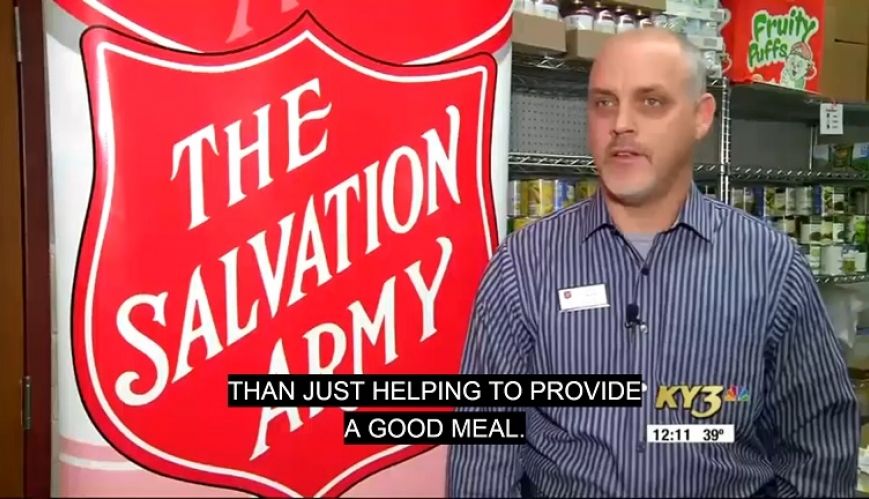Salvation Army extends help to shutdown-affected workers in US

Salvation Army extends help to shutdown-affected workers in US
18 January 2019
Jeff Smith, Salvation Army Community Relations Director in Springfield Missouri, speaks about the food, faith and hope available to all at the Army’s food pantry.
The Salvation Army is one of several groups stepping up to offer some relief to furloughed government employees, those working without pay, or anyone else affected, as they navigate the unexpected stress and financial hardship triggered by the partial shutdown.
Nearly four weeks into what’s become the longest government shutdown in United States history, many across the country are beginning to feel the financial impact of the impasse.
Many of the more than 800,000 federal workers and roughly four million more government contractors affected have now missed their first paycheck. For some of them, this may mean they need to rein in their spending on non-essentials, or simply tighten their monthly budget. But for others living paycheck to paycheck, missing just one could mean they can’t pay their mortgage, or afford groceries, medicine, or child care.
Lieutenant Liz Blusiewicz, Corps Officer in Huntington, West Virginia, told a local TV station that, whether it’s food assistance, clothing vouchers or help paying utility bills, The Salvation Army will serve anyone struggling to keep their heads above water for as long as the shutdown lasts.
“My thoughts are just, ‘man this is going on forever’ and I want to make sure no family is going on without food,” she said. “We don’t know how long this is going to last. There’s really no end [in] sight for us. That’s why we’re here; to hear that story and to help so that every family knows you don’t have to walk through this alone.”
In Grand Junction, Colorado, The Salvation Army paired with Food Bank of the Rockies to host a pop-up food bank to distribute both fresh and non-perishable items.
“You do not need to be a federal employee to receive help,” the food bank posted on its Facebook page. “We know the shutdown affects many families.”
In Springfield, Missouri, The Salvation Army’s food pantry typically operates only on Wednesdays, but it’s now running Monday through Friday to help those feeling the shutdown pinch.
“Who knows how much longer it’s going to go, so we just want to be available to those workers who may need a little bit of extra help with food,” said Jeff Smith, Salvation Army Community Relations Director. “We want to help people, and we realise this is kind of a special circumstance for those individuals.”
Beyond being able to provide a warm meal to more people, The Salvation Army hopes the increase in pantry hours will help provide peace of mind for those struggling to make ends meet.
“Worry and fear can do a lot of damage to folks if it’s not addressed, and that’s one thing where we’re trying to help people not to have that fear, not to have that worry,” said Jeff. “Come over and see us. Help us share with you not only the food, but some faith and hope.”
Looking ahead, the shutdown could also affect the Supplemental Nutrition Assistance Program (SNAP), America’s largest food aid program. While more than 38 million Americans rely on SNAP benefits to feed their families, funding for the program is not guaranteed beyond the month of February, if the shutdown persists.
Lieutenant Matt Degonia, corps officer in Cape Girardeau, Missouri, told local media that the majority of the people they serve are on food stamps.
“It’s a very diverse group of people,” he said. “The poor in our community need that program so if it’s shutdown for whatever reason it would be a huge detriment. I just don’t know how people will be able to make ends meet.”
If SNAP funding dries up, Lieut Degonia said it will consequently put a strain on local food pantries, which can only provide a fraction of what the USDA program can.
“It’s kind of a cascading effect,” he said. “Obviously we are going to help people as much as we can. But we could never supplement SNAP ourselves here. There is no way.”
This article first appeared in the New Frontier Chronicle.
Comments
No comments yet - be the first.